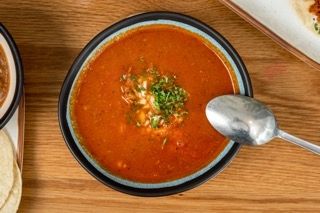Is Mexican Food Healthy And Balanced? Unboxing the Nutritional Conveniences of Standard Ingredients
The inquiry of whether Mexican food is healthy welcomes an exploration of its conventional components. Beans and corn work as foundational staples, abundant in protein and fiber. Avocados give beneficial fats, while numerous herbs and seasonings add taste and health benefits - best mexican westchester NY. Together, these parts create a tapestry of nourishment. The healthiness of Mexican cuisine usually depends on preparation techniques and section sizes. What function do these aspects play in establishing its overall nutritional worth?
The Power of Beans: Protein and Fiber-Rich Staples
Commonly forgotten, beans serve as a foundation of Mexican cuisine, offering a wide range of dietary advantages. Rich in protein, they are an exceptional plant-based option for those looking for to meet their dietary protein needs. This high protein content sustains muscle repair service and development, making beans vital for both meat-eaters and vegetarians alike. Additionally, beans are an exceptional resource of nutritional fiber, which helps in food digestion and advertises a sensation of volume, possibly assisting with weight management.
The selection of beans used in Mexican meals, such as black beans, pinto beans, and kidney beans, contributes to a varied taste account and can enhance dishes nutritionally. Beans are low in fat and have crucial vitamins and minerals, including iron, folate, and magnesium. With each other, these qualities make beans an important component, providing both sustenance and sustenance in traditional Mexican fare.

Corn: a Versatile Grain With Nutritional Conveniences
Corn stands out as a versatile grain essential to Mexican food, commemorated not only for its cooking applications yet additionally for its excellent dietary account. As a key component in recipes like tortillas, tamales, and pozole, corn offers vital nutrients that add to a balanced diet plan. Rich in carbohydrates, it works as a significant power resource, while likewise being low in fat, making it a beneficial choice for different nutritional demands.
Corn is an excellent source of dietary fiber, which aids in food digestion and promotes satiety. It consists of considerable quantities of vitamins such as B-complex vitamins, which are vital for energy metabolism. The visibility of antioxidants, especially carotenoids, adds to total wellness by decreasing oxidative anxiety. Furthermore, corn is gluten-free, dealing with those with gluten sensitivities. Generally, the dietary benefits of corn underscore its significance in conventional Mexican food and its function in a healthy and balanced diet plan.
Avocados: Healthy And Balanced Fats and Nutrients in Every Bite
Avocados play a considerable duty in Mexican cuisine, matching dishes with their creamy texture and rich flavor. Beyond their culinary charm, avocados are commemorated for their outstanding nutritional profile. They are a rich resource of healthy and balanced monounsaturated fats, which can help lower poor cholesterol degrees and assistance heart health and wellness. In addition, avocados are loaded with vital minerals and vitamins, including potassium, vitamin E, and B vitamins, adding to overall wellness.
The high fiber material in avocados aids food digestion and advertises satiation, making them a beneficial addition to any meal. Their one-of-a-kind nutrient composition can also sustain skin health and give anti-inflammatory benefits. Including avocados into conventional Mexican dishes or enjoying them as a standalone treat can boost both taste and nourishment, showing why they are a beloved staple in Mexican cuisine. Generally, avocados provide a delicious method to enjoy healthy and balanced fats and important nutrients in every bite.
Spices and Natural Herbs: Flavorful Wellness Boosters
While delighting in the abundant tastes of Mexican cuisine, one can not ignore the essential duty that spices and herbs play in boosting both preference and wellness. Active ingredients such as chili, cilantro, and oregano peppers not just contribute to the lively taste profile but additionally provide substantial wellness benefits. Cilantro is understood for its detoxing residential properties, aiding to remove hefty steels from the body, while oregano is loaded with antioxidants and possesses anti-inflammatory effects.
Chili peppers, a staple in several Mexican meals, have capsaicin, which has actually been connected to improved metabolic process and pain relief. In addition, seasonings like cumin and coriander support digestion and might assist in blood sugar level guideline. Integrating these flavorful health boosters right into meals not only improves the culinary experience yet likewise advertises general wellness, making Mexican food not simply delicious, yet also nutritionally advantageous.
Standard Cooking Approaches: Enhancing Nutrition and Taste
Traditional cooking techniques in Mexican food play a vital function in boosting both nourishment and taste, as they typically prioritize time-honored techniques and fresh components. Strategies such as nixtamalization, where corn is saturated and cooked in an alkaline remedy, not just boost the nutrient profile of tortillas however likewise enhance their digestibility - take out and delivery. Additionally, the usage of sluggish cooking techniques, like stewing or braising, enables tastes to meld perfectly while preserving the wing places near me honesty of the components

Frequently Asked Inquiries
Are Mexican Food Portions Typically Larger Than Various Other Foods?
Mexican food portions are commonly bigger than those of lots of various other cuisines. This particular shows standard dining practices, highlighting communal sharing and hearty dishes, which can bring about an extra substantial serving size in general.
Exactly how Does the Prep Work Technique Affect Healthiness of Mexican Food?
Prep work approaches significantly influence the healthfulness of Mexican food. Strategies such as barbecuing or steaming protect nutrients, while frying can raise undesirable fat web content. Selections of components and cooking styles eventually identify overall nutritional value.
Can Mexican Food Be Customized for Particular Nutritional Restrictions?
Mexican food can undoubtedly be tailored for particular nutritional limitations. Alternatives, such as utilizing corn tortillas for gluten-free diet plans or incorporating even more vegetables, make it possible for individuals to appreciate typical flavors while suiting different dietary requirements.
What Are Typical Misunderstandings Regarding Mexican Food and Health?
Typical misconceptions about Mexican food consist of the belief that it is naturally undesirable, extremely hot, and entirely concentrated on fats. In truth, traditional meals usually include healthy active ingredients and can be customized to different dietary needs.
Exist Healthier Choices at Mexican Restaurants?
Healthier alternatives at Mexican dining establishments often include barbequed meats, beans, and fresh vegetables. Choosing meals that emphasize entire components and avoiding heavy sauces can bring about an extra nutritious dining experience, advertising overall well-being.
The variety of beans used in Mexican recipes, such as black beans, pinto beans, and kidney beans, contributes to a diverse taste account and can boost meals nutritionally. Avocados play a substantial function in Mexican cuisine, complementing dishes with their velvety texture and abundant taste. Integrating avocados right into conventional Mexican dishes or enjoying them as a standalone treat can boost both flavor and nutrition, demonstrating why they are a beloved staple in Mexican food. While enjoying the abundant tastes of Mexican cuisine, informative post one can not forget the vital role that spices and natural herbs play in improving both taste and wellness. Standard cooking techniques in Mexican cuisine play a crucial function in boosting both nourishment and taste, as they typically prioritize fresh ingredients and classic strategies.